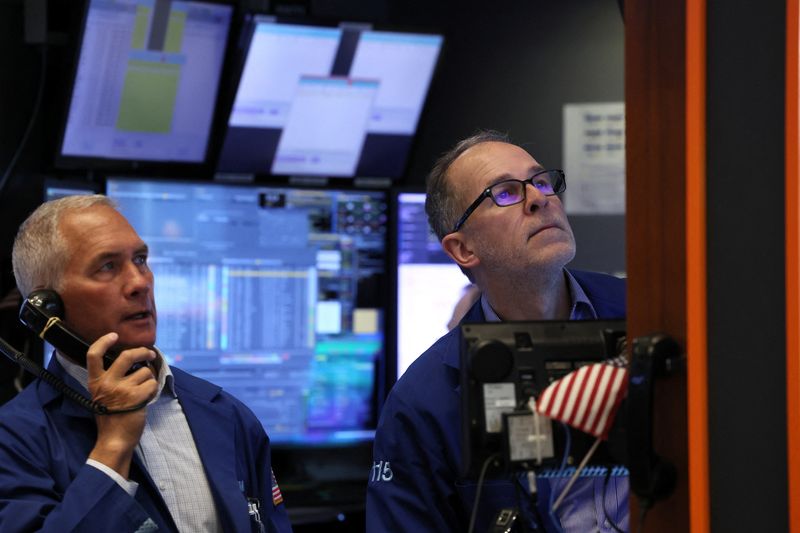By Sinéad Carew and Johann M Cherian
(Reuters) -Wall Street's main indexes closed lower on Monday after Federal Reserve Chair Jerome Powell pushed back firmly against speculation that rate cuts would be imminent, while investors assessed a mixed bag of U.S. earnings reports.
In an interview aired on Sunday, Powell said more evidence on a sustainable downtrend in inflation was needed to warrant lower rates, while Minneapolis Fed President Neel Kashkari wrote in an essay published on Monday that a resilient economy could defer rate cuts for some time.
Fresh data from the Institute for Supply Management showed the U.S. services sector's growth picked up in January, with a measure of input prices rising to an 11-month high.
This added to doubts about rate cuts, already kindled by Friday's data, which signaled the labor market's resilience in the face of tight credit conditions.
Adding pressure was U.S. Treasuries, with 10-year yields up for second day straight and hitting their highest level since late January. [US/]
"Chairman Powell threw a wet blanket over trading today, taking any chance of a March rate cut off the table," said Jack Ablin, chief investment officer at Cresset Capital in Chicago.
But with all three of Wall Street's major indexes paring losses as the session wore on, Ablin said investors are likely conflicted since positive economic data supports higher rates.
"Equity investors are torn between the higher rates and the stronger growth. They're no longer sure that good is bad news," he said. "Stronger growth on the economic front gives the Fed more flexibility to keep rates higher and know they're not going to kill the economy but still have a potent weapon against inflation."
And since Monday's decline followed record high closing levels in the benchmark S&P 500 and the blue-chip Dow on Friday, Carol Schleif, chief investment officer at BMO (TSX:BMO) family office in Minneapolis, Minnesota, saw it as a potential opportunity for investors who had been on the sidelines.
"The market had gotten way out over its skis, especially coming out of November, December," Schleif said, adding that she was "not viewing this as the start of a major pullback."
The Dow Jones Industrial Average fell 274.30 points, or 0.71% , to 38,380.12, the S&P 500 lost 15.80 points, or 0.32%, to 4,942.81 and the Nasdaq Composite lost 31.28 points, or 0.20%, to 15,597.68.
The S&P 500 materials sector was the biggest sector decliner, ending down 2.5%, dragged down by a 15.6% decline in Air Products (NYSE:APD) after the industrial gas manufacturer forecast 2024 profit below estimates.
Of 11 major S&P sectors, only two gained ground with technology adding 0.6% and a 0.3% gain in healthcare.
Results were in from nearly half of the S&P 500 firms and fourth-quarter earnings estimates were improving sharply, with about 80% of the reports beating expectations, according to LSEG data on Friday.
"Mostly earnings season has been pretty mixed bag. It's been more stock specific than industry specific," said BMO's Schleif.
Caterpillar (NYSE:CAT) closed up 2% after hitting a record high following its report of a higher quarterly profit, while Estee Lauder (NYSE:EL) shares surged 12% as the MAC lipstick maker aims to cut about 3% to 5% of its workforce.
Boeing (NYSE:BA) shares slipped 1.3% after it said a new quality glitch in some 737 MAX planes would delay some deliveries.
Tesla (NASDAQ:TSLA) shares closed down 3.7% after touching its lowest level since May during the session. Piper Sandler slashed the stock's price target.
Nvidia hit a fresh record high following a price-target raise by Goldman Sachs (NYSE:GS) and closed up 4.8%.
Catalent (NYSE:CTLT) shares soared 9.7% on Novo Nordisk (CSE:NOVOb) parent Novo Holdings' plans to buy the contract drugmaker in an $11.5-billion all-cash deal.
Declining issues outnumbered advancers by a 4.2-to-1 ratio on the NYSE. There were 142 new highs and 124 new lows on the NYSE.
On the Nasdaq 1,167 stocks rose and 3,136 fell as declining issues outnumbered advancers by about a 2.7-to-1 ratio.

The S&P 500 posted 29 new 52-week highs and 11 new lows while the Nasdaq recorded 86 new highs and 209 new lows.
On US exchanges 10.99 billion shares changed hands compared with the 11.58 billion moving average for the last 20 sessions.